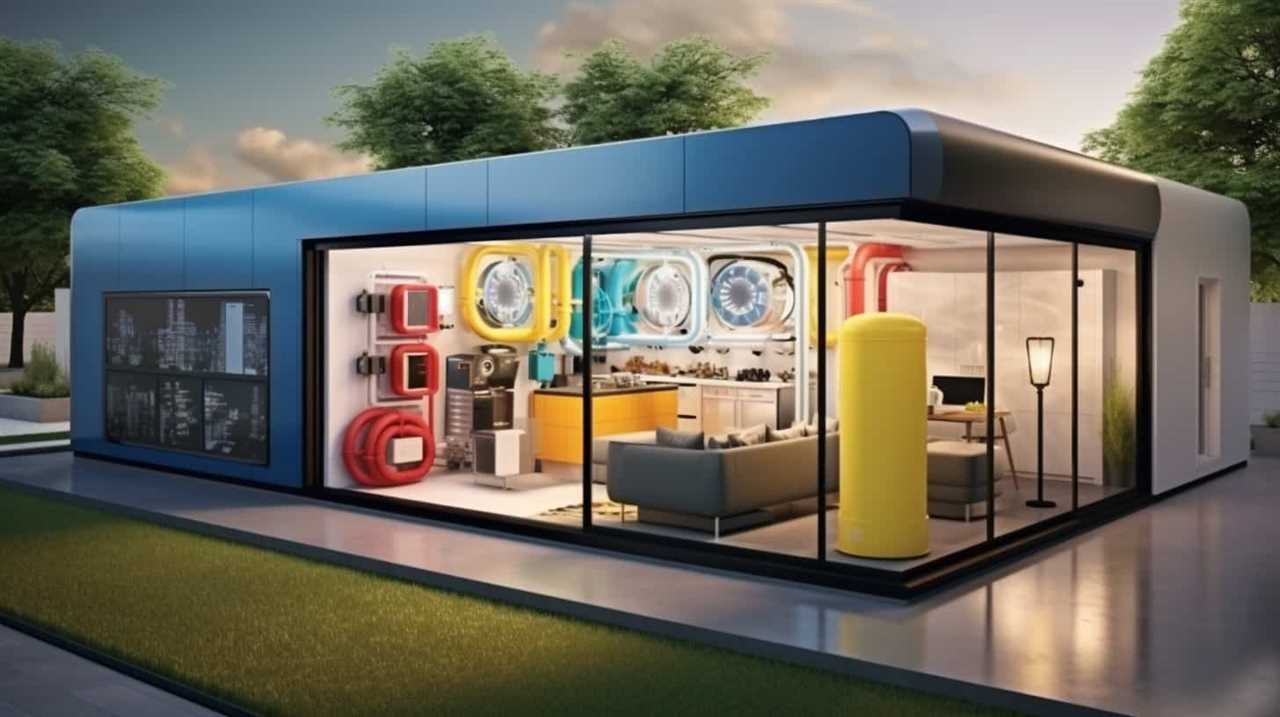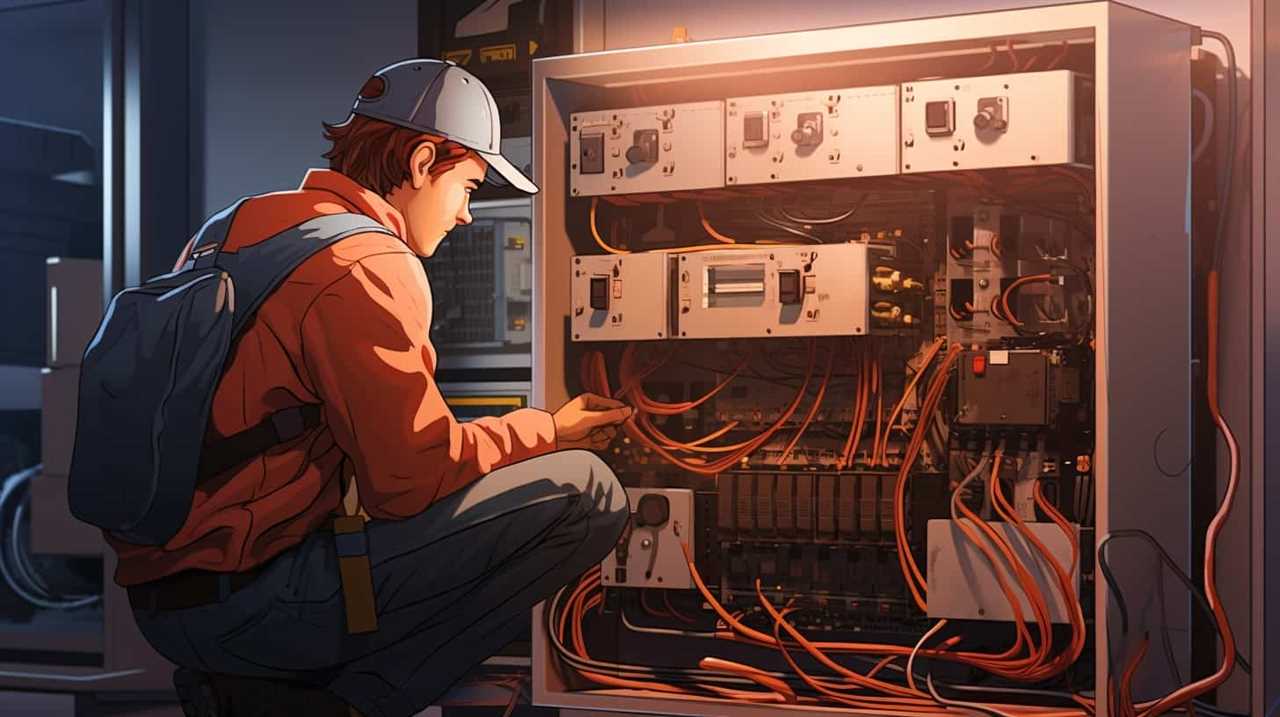Considering upgrading your HVAC system? Our beginner’s guide to heat pumps in your home’s HVAC will provide you with all the information you need.
From how they work to the benefits of installing one, we’ve got you covered. And don’t worry, we’ll help you choose the right size and understand the efficiency and maintenance too.
Get ready to take your HVAC game to the next level with a heat pump.
Key Takeaways
- Heat pumps provide both heating and cooling capabilities, reducing the need for separate heating and cooling systems.
- Choosing the right size heat pump is crucial for optimal performance, energy efficiency, and comfort in your home.
- Incorrectly sized heat pumps can lead to increased energy consumption, discomfort, and unnecessary wear and tear.
- Regular maintenance, proper installation, and understanding heat pump efficiency can result in significant energy savings and cost-effectiveness.
How Heat Pumps Work in Residential HVAC Systems
Let’s dive into how heat pumps work in residential HVAC systems.

Heat pump installation is a crucial step in ensuring efficient heating and cooling in your home. These systems use a refrigeration cycle to transfer heat from one area to another, providing both heating and cooling capabilities.
During operation, the heat pump extracts heat from the air or ground outside and transfers it indoors during the winter months. In the summer, the process is reversed, with the heat pump extracting heat from inside and releasing it outside.
This cycle is made possible by the refrigerant, which absorbs and releases heat as it circulates through the system.
Benefits of Installing a Heat Pump in Your Home’s HVAC
One of the main benefits of installing a heat pump in our home’s HVAC system is that it can significantly reduce our energy consumption and lower our utility bills.

Heat pumps are highly cost-effective due to their energy efficiency. Unlike traditional heating and cooling systems, which rely on fuel combustion or electric resistance heating, heat pumps transfer heat from the air or ground to warm or cool our homes. This process requires less energy and results in substantial savings on our energy bills.
Moreover, heat pumps have a minimal environmental impact. By using renewable heat sources and minimizing the use of fossil fuels, heat pumps contribute to reducing greenhouse gas emissions and combating climate change.
Installing a heat pump isn’t only a smart financial decision but also an eco-friendly choice for our homes.
Choosing the Right Size Heat Pump for Your Residential HVAC System
When it comes to choosing the right size heat pump for your residential HVAC system, there are several important considerations to keep in mind. Sizing a heat pump involves assessing factors such as the square footage of your home, the climate in your region, and the insulation levels in your house.

Selecting a heat pump that’s too small or too large for your needs can have significant consequences, including decreased energy efficiency, increased wear and tear on the system, and inadequate heating or cooling performance.
Sizing Considerations for Heat Pump
As we consider sizing considerations for a heat pump, it’s important to choose the right size heat pump for our residential HVAC system. Proper sizing is crucial for optimal performance and energy efficiency.
When it comes to heat pump installation, a unit that’s too small may struggle to meet the heating or cooling demands of our home, resulting in discomfort and increased energy consumption. On the other hand, a unit that’s too large can lead to frequent on-off cycling, which not only wastes energy but also puts unnecessary strain on the system.
Additionally, selecting the right size heat pump for our residential HVAC system is essential for proper heat pump maintenance. A correctly sized unit ensures that the system operates at its peak efficiency, extends its lifespan, and reduces the need for costly repairs.

Therefore, it’s important to consult with a professional HVAC contractor to determine the proper size for our heat pump based on factors such as our home’s square footage, insulation levels, and climate conditions.
Impact of Wrong Size?
To ensure optimal performance and energy efficiency in our residential HVAC system, it is crucial to choose the right size heat pump. Incorrect sizing can have a significant impact on the overall efficiency and effectiveness of the system. When the heat pump is too small for the space, it will struggle to meet the heating or cooling demands, resulting in increased energy consumption and decreased comfort levels. On the other hand, if the heat pump is too large, it will cycle on and off frequently, leading to inefficient operation and unnecessary wear and tear. To help you understand the impact of incorrect sizing, take a look at the table below:
| Incorrect Sizing | Energy Efficiency |
|---|---|
| Too Small | Decreased |
| Too Large | Decreased |
Choosing the right size heat pump is essential for maintaining optimal energy efficiency in your residential HVAC system.
Understanding Heat Pump Efficiency and Energy Savings
We can maximize energy savings by understanding the efficiency of a heat pump. Here are four key points to consider when it comes to heat pump efficiency and energy savings:

-
Proper installation: The heat pump installation process plays a crucial role in its efficiency. A correctly installed heat pump ensures optimal performance and energy savings.
-
Size and capacity: Choosing the right size and capacity for your heat pump is essential. Undersized or oversized units can lead to inefficiency and higher energy consumption.
-
Climate considerations: The climate you live in affects the efficiency of your heat pump. Heat pumps work most efficiently in moderate climates, while extreme temperatures can reduce their performance.
-
Regular maintenance: Regular maintenance is crucial for maintaining the efficiency of your heat pump. Clean the filters, check refrigerant levels, and schedule professional inspections to ensure optimal performance.

Understanding heat pump efficiency and implementing the necessary measures can lead to significant energy savings.
Now, let’s explore how to maintain and troubleshoot your heat pump in your home’s HVAC system.
Maintaining and Troubleshooting a Heat Pump in Your Home’s HVAC
When maintaining and troubleshooting a heat pump in our home’s HVAC system, it’s important to regularly inspect and clean the filters, check refrigerant levels, and schedule professional maintenance to ensure optimal performance.
Regularly inspecting and cleaning the filters is crucial for maintaining airflow and preventing dust and debris from entering the system.

Checking refrigerant levels is essential to ensure that the heat pump is operating at peak efficiency. Low refrigerant levels can indicate a leak, which should be addressed promptly to avoid further damage.
Scheduling professional maintenance is recommended to identify and fix any potential issues before they become major problems. Additionally, troubleshooting common heat pump problems such as inadequate heating or cooling, strange noises, or unusual odors can help identify and resolve issues quickly.
By following these maintaining tips and troubleshooting guide, homeowners can ensure that their heat pump operates efficiently and effectively.
Transition: Now that we understand the importance of maintaining and troubleshooting a heat pump, let’s explore how heat pumps compare to other HVAC systems for residential use.

Comparing Heat Pumps to Other HVAC Systems for Residential Use
When comparing heat pumps to other HVAC systems for residential use, there are two key points to consider: efficiency and cost.
Heat pumps are known for their high efficiency, as they can provide both heating and cooling using a minimal amount of energy. This not only reduces your carbon footprint but also lowers your utility bills.
Additionally, heat pumps are often more cost-effective compared to other HVAC systems, as they eliminate the need for separate heating and cooling units, resulting in lower installation and maintenance costs.
Efficiency Comparison: Heat Pumps
Let’s compare the efficiency of heat pumps to other HVAC systems commonly used in residential settings. When evaluating the efficiency of HVAC systems, there are several key factors to consider:

-
Energy Efficiency Ratio (EER): This measures the cooling efficiency of the system by comparing the amount of cooling produced to the amount of energy consumed.
-
Seasonal Energy Efficiency Ratio (SEER): This is similar to EER but takes into account the seasonal variations in temperature. A higher SEER rating indicates better efficiency.
-
Coefficient of Performance (COP): This measures the heating efficiency of the system by comparing the amount of heat produced to the amount of energy consumed.
-
Heating Seasonal Performance Factor (HSPF): This is similar to COP but takes into account seasonal variations. A higher HSPF rating indicates better efficiency.

When conducting a performance analysis, it’s important to consider these efficiency factors to determine the most efficient HVAC system for your residential needs.
Cost Comparison: Heat Pumps
Our aim is to compare the cost of heat pumps to other HVAC systems commonly used in residential settings.
When it comes to cost, heat pumps have a clear advantage over traditional HVAC systems. While the initial installation of a heat pump may be more expensive, the long-term cost savings are significant. Heat pumps are highly efficient and can provide both heating and cooling, eliminating the need for separate systems. This means lower energy consumption and reduced utility bills.
Additionally, heat pumps are designed to transfer heat rather than generate it, resulting in lower operating costs. Over time, these savings can outweigh the initial investment, making heat pumps a cost-effective choice for homeowners.

When considering the financial aspect, it’s clear that heat pumps offer a compelling alternative to traditional HVAC systems.
Common Misconceptions About Heat Pumps in Residential HVAC Systems
Many homeowners have misconceptions about how heat pumps work in their residential HVAC systems. It’s important to understand these common misconceptions in order to make informed decisions about using a heat pump in your home’s HVAC.
Here are four key misconceptions to be aware of:
-
Heat pumps only work in warm climates: Contrary to popular belief, heat pumps can effectively heat and cool homes in a wide range of climates, including colder regions.

-
Heat pumps aren’t efficient: Heat pumps are actually highly efficient, as they transfer heat from one place to another instead of generating it. This can result in significant energy savings and lower utility bills.
-
Heat pumps don’t provide enough heat: Heat pumps can provide ample heat, even in colder temperatures. However, in extremely cold climates, they may need supplemental heating.
-
Heat pumps require frequent repairs: With proper maintenance, heat pumps can be reliable and durable. Regular servicing and upkeep can help prevent major repairs.
Frequently Asked Questions
How Long Does a Heat Pump Typically Last in a Residential HVAC System?
Heat pumps typically last around 15 to 20 years in a residential HVAC system. They offer numerous benefits, such as energy efficiency and year-round comfort. Regular maintenance and proper usage can help prolong their lifespan.

Can a Heat Pump Be Used as the Sole Heating and Cooling Source in a Home?
Yes, a heat pump can be a cost-effective and energy-efficient option for both heating and cooling a home. It provides consistent comfort throughout the year and is a popular choice among homeowners.
Are Heat Pumps Noisy When They Are Operating?
When operating, heat pumps can produce noise, but advancements in technology have made them significantly quieter. The benefits of heat pumps, including their high efficiency, outweigh any potential noise concerns.
What Is the Average Cost of Installing a Heat Pump in a Residential HVAC System?
The average cost of installing a heat pump in a residential HVAC system can vary depending on factors such as the size of the unit and any additional modifications needed.
Do Heat Pumps Require Regular Maintenance or Servicing?
Heat pumps require regular maintenance and servicing to ensure optimal performance. We recommend scheduling professional inspections and cleaning to keep your system running efficiently. Neglecting heat pump maintenance can lead to costly repairs and decreased energy efficiency.

Conclusion
In conclusion, installing a heat pump in your home’s HVAC system can offer numerous benefits, including energy efficiency, cost savings, and year-round comfort.
By understanding how heat pumps work, choosing the right size for your home, and properly maintaining and troubleshooting the system, you can enjoy optimal performance and longevity.
Don’t let common misconceptions sway your decision; embrace the rhythm of a heat pump and experience the harmony of a well-functioning residential HVAC system.









